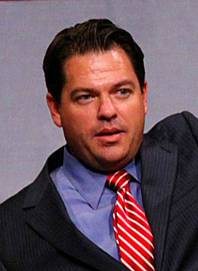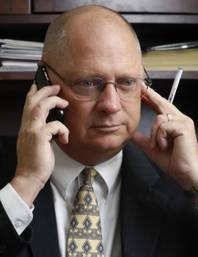Sunday, March 20, 2011 | 2 a.m.

Sen. Michael Roberson

Chuck Muth
Sun archives
- Counties fearful of Sandoval’s budget (3-8-2011)
- Gov. Brian Sandoval’s budget means job, service cuts for Clark County (1-26-2011)
- County struggles to balance budget as property tax revenue tanks (1-12-2011)
- Gov. Brian Sandoval closes loophole, will maintain payroll tax rate (1-12-2011)
- Loophole a threat to Gov. Brian Sandoval’s tax pledge (1-12-2011)
- County leaders worry state will raid local funds amid shortfall (1-10-2011)
- Gov. Brian Sandoval’s quest: Blocking a tax hike (1-9-2011)
- Sandoval increasingly isolated in his anti-tax stance (12-29-2010)
- State has upper hand in budget turf war (12-27-2010)
- Sandoval to build own budget (12-22-2010)
- Panels propose ideas to squeeze state budget (12-4-2010)
- Polished knife still cuts deep into state’s budget (11-28-2010)
- Expect Sandoval to flex his newfound political capital on his anti-tax pledge (11-10-2010)
- Let Sandoval take heat for budget, Democrats say (11-5-2010)
- Brian Sandoval: Let local officials raise taxes (10-19-2010)
- $2.5 billion state budget deficit: ‘Best-case scenario’ (4-23-2010)
- Proven again: Home rule a lost cause (7-28-2009)
Nevada’s Taxpayer Protection Pledge has been celebrated by some as a covenant that holds politicians to their word not to raise taxes. Others revile it as an unnecessary restriction on lawmakers’ ability to address tough issues.
This legislative session will test whether it lives up to its name and protects taxpayers — large and small — from a heavier tax burden.
Take the mining industry, for instance. Sen. Michael Roberson, R-Las Vegas, who signed the tax pledge, questions whether “foreign mining companies that ship their profits out of state” are paying their fair share in state taxes. He has proposed a mining tax increase in conjunction with a decrease in car registration fees.
Or, take service providers such as hairdressers and accountants. Some lawmakers are discussing applying the sales tax to services while lowering its rate so the revenue collected remains the same.
Others have talked about eliminating the payroll tax and replacing it with a services tax.
Those who have signed the tax pledge say although their proposals would constitute a tax increase on some, in the broader view they would be “revenue neutral.”
In a state where politicians are fearful of even uttering the word tax, such an approach to broadening the tax base could gain traction.
“The concept behind the pledge is that it is a mechanism to limit the size of government,” Roberson says. “It does not mean we can’t look at fair and equitable ways to reform the tax structure. And the mining industry is a shining example of where we could make it more equitable.”
The pledge, signed by eight state lawmakers, simply says: “I pledge to the taxpayers and all the people of this state that I will oppose and vote against any and all efforts to increase taxes.”
Nevada conservative operative Chuck Muth — who is affiliated with the Washington group that created the pledge, Americans for Tax Reform, and functions as the self-appointed arbiter of who is and isn’t in compliance — agrees that neither Roberson’s proposal nor implementation of a services tax would violate the pledge.
“The purpose is to keep government from growing,” Muth says, echoing Roberson.
Muth acknowledges, however, that such proposals could result in more revenue flowing into government coffers when the economy picks up — even above the increase in tax revenue that would be expected from an economic recovery, thereby leading to an increase in the size of government.
“I’m not saying we would support that notion,” Muth said. “But it’s not a violation of the pledge if it is revenue neutral. In fact, we’d probably come out and oppose it, but we wouldn’t be able to bludgeon (the lawmakers) for breaking the tax pledge.”
Because there are only eight, the pledgers aren’t seen as a powerful voting bloc in the Legislature. If lawmakers end up raising taxes, these lawmakers would presumably vote no. But if a serious effort is undertaken to broaden Nevada’s tax base, which relies heavily on sales and gaming taxes, the pledgers could play a pivotal role in framing the debate.
The pledgers in the Legislature are divided on revenue neutral reforms.
Sen. Barbara Cegavske R-Las Vegas, and Assemblyman Richard McArthur, R-Las Vegas, said they don’t believe in revenue neutral tax changes.
“I’m very skeptical of doing anything like that,” Cegavske said. “To me a tax is a tax.”
Assemblymen John Hambrick, R-Las Vegas; Pete Livermore, R-Carson City; and Ed Goedhart, R-Amargosa Valley, all think the tax structure could be more equitable by increasing taxes in some areas and decreasing them in others.
Sen. Elizabeth Halseth, R-Las Vegas, said she doesn’t have an opinion on whether revenue neutral reform is acceptable under the pledge.
Some worry such an approach would only perpetuate state lawmakers’ propensity to target industries for tax increases that are deemed more politically palatable. (Think of mining at a time of record gold prices.)
“We’re against industry-specific taxes,” said Paul Enos, lobbyist for the Nevada Motor Transport Association. “I don’t think you can say mining are the big bad guys, go tax them. A few years ago it was truckers. In 2003, it was banks. Then it was gaming. We need to take a much different approach.”
Gov. Brian Sandoval, who has refused to sign the tax pledge but vowed not to raise taxes during the recession, is skeptical whether revenue neutral reform is possible, according to his senior adviser, Dale Erquiaga.
“In the end, someone would be paying more in taxes” and that would violate Sandoval’s promise, Erquiaga says.
That position puts the governor, long considered a moderate, to the right of Muth, one of Nevada’s most strident anti-tax voices.
“Suddenly he’s the right-winger here and I’m the moderate,” Muth says.

Join the Discussion:
Check this out for a full explanation of our conversion to the LiveFyre commenting system and instructions on how to sign up for an account.
Full comments policy